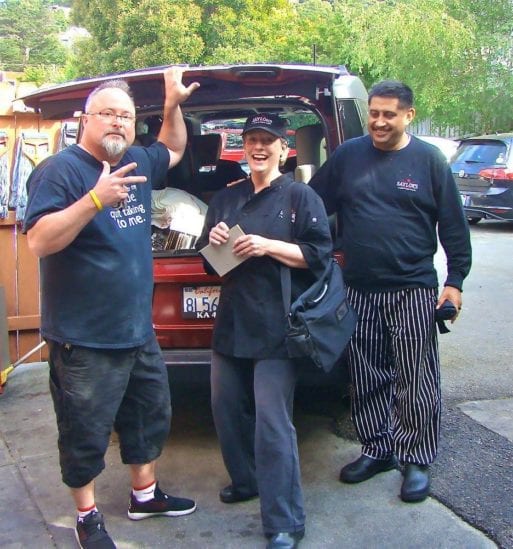
Dr. Elizabeth Sutherland (right) and a friend
Today SevenPonds talks with Dr. Elizabeth Sutherland. Dr. Sutherland is a geropsychologist who practices in Sausalito, California. Geropsychology is a combination of geriatrics and traditional psychology. The needs, anxieties and causes of depression in older populations vary from those of children and younger adults, so specialization in the field is extremely beneficial for clients. Dr. Sutherland regularly works with dementia patients, so she is well-versed with cognitive disorders and decline as well.
Editors note: This interview has been edited for length and clarity.
Lucas Morgan: Hello Elizabeth! Thanks for speaking with me today. I think we’ll start with some preliminary information. What are your educational and professional backgrounds?
Elizabeth Sutherland: So the field of geriatric psychology is like my fifth career. I felt that I was too young in my 20s to go to grad school for geriatrics. Because, what person over 65 wants to talk to a twenty-something-year-old about dying, sexuality and the like? So I initially went into the hospitality industry for a while.
Eventually, I got my bachelor’s in psychology from Sonoma State University and got my master’s and my doctorate in clinical psychology at John F. Kennedy University. I specialized in geropsychology and had to make the pathway for that myself because nobody else had done geriatrics before. I did my initial geriatrics training at the San Francisco VA Medical Center and completed my residency at Mount Sinai in Manhattan. I then came back to complete a fellowship at SFVAMC and was eventually hired there in 2008. Now I do home visits for the SFVAMC. I also have my own private practice, and I also teach at both UCSF and JFKU.
Lucas: Well it certainly sounds like you have a lot going on! How would you describe the field of geropsychology to someone who’s never heard of it?
Elizabeth: I am a clinical psychologist and I specialize in geriatrics. That’s why I’m called a geropsychologist. In this field, you have to specialize in not only geriatrics but also neuropsychology as well.
Lucas: So what are some key differences between your work and what you might call “normal” psychology?
Elizabeth: Well with normal, private practice psychology you may specialize with children or teenagers. With adults you may work with couples or families, and their life transitions. However, with geriatrics, you’re really focusing on people who are 65 and older.

Dr. Sutherland enjoys some time off with her friend, restaurateur Sean Saylor and his head chef
So you’re going through their transitions, which could be so many different things. Some people may have issues related to retiring, some could be raising their grandchildren, and for others, maybe their retirement plans aren’t going the way they thought they would. I also work with people who have had strokes and other illness or injuries, so we’ll discuss how debilitating those can be. Also, the issue of grief comes up when someone has lost their spouse. And then there’s the whole aspect of the brain and cognitive issues.
Lucas: Why did you decide to work with the elderly population? What drew you to geropsychology?
Elizabeth: My experience with my grandfather, for sure. He told me stories throughout my life, and I remember when I was a senior in high school all of a sudden he couldn’t remember the endings. He couldn’t remember punch lines, and I just wondered, “What is going on?”
I eventually lived with him, helping my mom take care of him. And I noticed that his brain just wasn’t working normally. He was such a terrific man, so I thought that I wanted to get into this field of work. But then I didn’t know how to go about it. I felt too young, and so I just waited. Now I’m in my 50s so people are more willing to talk to me about their issues.
Lucas: How long has geropsychology been a specific field of study?
Elizabeth: I don’t think that long, really. I remember in the late 1980s when somebody had dementia they were called “senile.” It was very much like, “Well [this person] is senile, they may have Alzheimer’s, but we won’t know until post-mortem.” Now, we’ve made so many advances with imaging and testing.
There are still not a lot of people who specialize in geriatric psychology. And this is what I tell my students: “You know what? This time we’re in now, this is it.” I like to call it the “silver tsunami.” The older population now is the largest it’s ever been.
Lucas: You mentioned that you make home visits for some patients. Why is this important for you?
Elizabeth: It just makes the entire process much more comfortable and easier for them. When people are older and have cognitive problems, there can be some paranoia and anxiety. If their family member says, “Tomorrow we’re going to go see Dr. Sutherland,” the person may be anxious all night because they know they’re supposed to go do something, but can’t remember what it is. The visit will then be skewed because they’re tired and paranoid. Unfortunately, it’s not a population that many people want to work with, which is sad. I think they’re wonderful. I love my job, so it makes it a bit easier.

Dr. Sutherland loves to photograph her home town of Sausalito, California
Lucas: You’re very well-versed in neurological problems and diseases that arise from the aging process. How does that come into play?
Elizabeth: That’s correct. A lot of my work is conducting neuropsychological assessments. I will test individuals to see if they have a diagnosis of cognitive impairment and what it may be, i.e. Alzheimer’s, Parkinson’s, Lewy body dementia, etc. I then will give recommendations around it. Are they safe to be at home still? Perhaps the main question I have to ask is, “Do they have the capacity to make medical and/or financial decisions?”
If someone does not have that capacity, I find out if they are married, or do they have someone in their life that can make those decisions? If not, I may have to go to the city or county and have the courts assess their competency and appoint a conservator or guardian. It can get really messy.
Lucas: And some people, I’m sure, are still generally “with it,” — not completely “gone” in terms of their dementia.
Elizabeth: Right. Some people are just teetering, and they still have their rights. When you claim that someone does not have the capacity to make decisions, you’re basically taking away all of their rights. That’s hard. So I make sure that when I go in to see them that there is no depression or anxiety skewing their decision-making.
Check back next week when we continue our conversation about geropsychology with Dr. Elizabeth Sutherland

 What Is Geropsychology?
What Is Geropsychology?


 How Dare You Die Now!
How Dare You Die Now!
 Debating Medical Aid in Dying
Debating Medical Aid in Dying
 “Help Me, Helen”
“Help Me, Helen”














